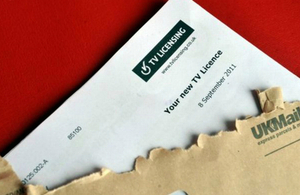Independent review on TV licence enforcement published
Government published independent review which looked at the current sanctions in place for failure to hold a TV licence

An independent review looking at the current sanctions in place for failure to hold a TV licence has found that the current system of criminal enforcement should be maintained, at least under the present system of licence fee collection.
It concludes that the current system is appropriate and fair, and represents value for money for licence fee payers and taxpayers. The review does recommend that:
- there is scope to improve the current system in relation to the transparency of the prosecution process, and the content and tone of TV Licensing communications; and
- when considering the structure of licence fee collection as part of the forthcoming Charter Review, a move towards a simpler system would assist in improving public understanding of what the licence fee covers.
David Perry QC who led the review said:
Following a detailed assessment of the various policy options the Review has concluded that there should be no fundamental change in the sanctions regime as it applies to the current licence fee collection system. The current regime represents a broadly fair and proportionate response to the problem of licence fee evasion and provides good value for money both for licence fee payers and taxpayers.
This Review has taken place shortly in advance of an in-depth review of the BBC’s Royal Charter. Any change to the method of licence fee collection is likely to have an impact on the viability of introducing a non-criminal scheme of enforcement. It is to be hoped that the recommendations and observations made in this report will be of assistance to those involved in the Charter Review.
The previous government had asked David Perry QC to look at the issue given concern that the criminal nature of the current regime was not a proportionate response to the problem of licence fee evasion.
Currently a person who installs or uses a television receiver without a TV licence is guilty of a criminal offence under the Communications Act 2003 and may be fined – currently a maximum of £1,000. In a small number of cases, where there is a refusal to pay the fine and where all other enforcement methods have been tried or considered, a person can be sent to jail for non-payment of a court-imposed fine.
In 2013 there were 178,332 prosecutions in England and Wales for the evasion offence. 153,369 people were convicted and of these 152,664 were fined. The review highlighted that, despite the large number of cases, they are dealt with efficiently and take up only 0.3 per cent of court time. 32 people were imprisoned for non-payment of a court fine imposed following conviction for TV licence evasion.
Having consulted with, and examined evidence from, a wide range of individuals and organisations, the Review concluded that any significant change to the current system of enforcement carries the risk of an increase in evasion and would involve significant costs to the taxpayer and licence fee payer.
The Review’s other recommendations include:
-
TV Licensing should explore ways to target unlicensed household visits more effectively, to increase the likelihood of an enquiry officer making contact with occupiers.
-
The BBC and Government should explore ways to investigate and consider the gender disparity in TV licence prosecutions. Research shows that around seven out of ten of those prosecuted were women, although the Review found no evidence to suggest that enforcement activity is unfairly and intentionally targeted at women.
-
The Government, in conjunction with the BBC, should explore ways of amending the current regulations to allow simple and flexible payment plans for those facing difficulty in paying the licence fee.
-
Consideration should be given to the introduction of a requirement for cable and satellite TV companies to share their subscription information with TV Licensing in order to improve the investigation and enforcement process.
-
TV Licensing should consider increasing the transparency of its prosecution and enforcement policy, and provide clearer guidance to those at risk of prosecution.
-
The Charter Review should look at non-linear viewing as a matter of urgency.
Secretary of State for Culture, Media and Sport, John Whittingdale MP, said:
I am most grateful to David Perry QC for producing a very thorough analysis of the practicalities and consequences of decriminalisation. This is an issue which we will wish to consider carefully as part of the Charter Review and this report will be an important contribution to that.
Government will now consider the report and its finding, and respond within three months.
Notes for editors
Media enquiries – DCMS News and Communications team – 020 7211 2210 or out of hours on 07699 751153.
-
The TV Licence Fee and Enforcement Review report can be found online. The Written Ministerial Statement made by the Secretary of State for Culture, Media and Sport, John Whittingdale MP, can be found on the Parliament’s website.
-
The previous government announced a review into TV Licence Enforcement, led by independent reviewer David Perry QC, on 9 September 2014. The Review looked at options for changing the current enforcement measures, including the decriminalisation of TV licence evasion offences, and whether these options would represent an improvement to the existing system.
-
The Review consulted on six policy options: * Retain the current criminal enforcement system. * Reform of current system: leave the current offence as it stands but reform the current criminal enforcement system. * Out of court settlement: retention of the criminal offence, with an option for disposal by way of an out of court settlement. * Fixed monetary penalty: retention of the criminal offence, with an option for disposal by way of a fixed monetary penalty. * Civil monetary penalty: decriminalise and enforce via a civil infraction. * Civil debt: decriminalise and enforce as a civil debt.